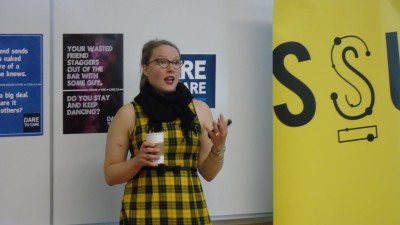
STORY AND PHOTOGRAPHY BY KELSEY LYONS
Yes means yes. Not “Meh,” not “Maybe,” nor “I don’t know.”
Last Wednesday, social justice activist Julie Lalonde came to Sheridan’s Hazel McCallion Campus to speak about her Draw the Line campaign, with a compelling lecture on sexual violence and the bystander effect.
She was welcomed by Sheridan president Jeff Zabudsky, whose presence was a sign of how seriously the college takes the problem.
“Sexual violence has no place at Sheridan,” he said.
Lalonde started the lecture by defining consent, not sexual assault, which she says is usually the first question people ask her.
“I think an even better place to start is with ‘What is the definition of consent?’ ” she said. “And if it doesn’t meet that definition, then that is what constitutes as sexual assault.
“Only ‘Yes’ means yes, and the absence of a ‘No’ does not mean you have consent,” she said. “I don’t have to say ‘No’ and push him away to make it clear that I’m not interested.”
She says one of the main problems is that young women believe that once they’ve said ‘Yes,’ they can’t take it back later. But that’s not true.
“So, ‘Yes’ to one thing doesn’t necessarily mean ‘Yes’ to absolutely everything you can put your mind to,” Lalonde said. “It’s, ‘I said Yes to this and that’s what we’re doing and then later on if we change to this, then you have to ask for my consent in that situation too.’ ”
Once you’ve said ‘Yes,’ said Lalonde, legally you can take it back whenever you want.
“They say: ‘Well I said ‘Yes’ at first, but now I’m not into it anymore. But now I’m not allowed to say no,’ ” said Lalonde. “That’s not true… I can say ‘Yes’ and then when we get back to your house I say, ‘Yeah I don’t feel good, you’re actually kind of creepy…’ You’re allowed to say ‘I was cool with it but now I want to go home.’”
The Draw the Line campaign is a provincial anti-violence campaign that specifically targets bystanders. The bystander effect occurs when you see something that may seem out of place or inappropriate – but decide to do nothing because you think someone else will take action. The phenomenon was first identified when people witnessed medical emergencies – but can occur elsewhere.
“It happens in all kinds of situations, not just heart attacks,” said Lalonde. “Something shady happens… ‘I don’t have to do anything because someone else will do something.’ Or ‘No one else is doing anything so I’m not going to bother get off my butt to help.’ ”
The campaign tries to get people to think about and share their thoughts on what they would do if they witnessed sexual violence.
“We ask real-life scenarios, we pose people questions in terms of what they would and wouldn’t do in different moments,” said Lalonde.
Lalonde says it’s important to ask these questions and raise awareness on the topic.
“Sexual violence is perpetrated in large part by our silence,” said Lalonde.
She says perpetrators know it’s taboo to talk about and can be embarrassing – and that victims aren’t likely to report the incident. That, says Lalonde, is where they get their power.
“It’s really important to talk about it because you’re taking it out of the shadows. You’re really disempowering the perpetrators and saying ‘You’re not going to get away with this and I’m not going to sit at home and be humiliated by this,’” said Lalonde. “’You should be embarrassed by what you did.’”
The campaign started in 2011.
“I’ve been working at it for four years and…I’m seeing that it has an impact,” said Lalonde.
That’s not how the first couple of years of the campaign went.
“I would see some blank stares, a lot of people saying ‘That doesn’t really happen here,’ ” she said. “Whereas now I think people are realizing that this is a thing that happens everywhere and a survivor and a victim could be anyone.”
Sheridan student Chelsea Wright says it’s important to start educating people on sexual violence and inform them at a younger age.
“When you’re younger you don’t really think about it, but as you get older you see it,” says the 18-year-old. “You’re exposed to everything and whatever you were taught when you were younger will show how you’re going to deal with these situations.”
Lalonde runs a website and blog at http://www.yellowmanteau.com/.
